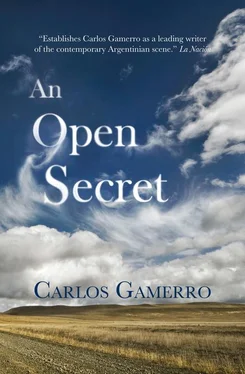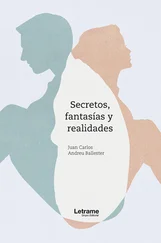“TRUTH BE TOLD I don’t know if it was the depression or a crisis of faith as people said or just the hots he had for that girl from Fuguet let’s call a spade a spade, he ended up leaving the priesthood and they must’ve got married I wouldn’t know and they lived in Córdoba for a while which was when we all lost track of them. And there were days when there was no getting him out of bed to say mass, we’d drilled the cleaning girl but there were times not even she could work the miracle and had to go knocking at your grandparents’ just next door or else at one of ours to give her a helping hand, I mean if he didn’t have the vocation what did he go and become a priest for in the first place so young and handsome he was when he arrived the girls wandered around in a daze over their new little priest and he started up that what do you call it the social work and the soup kitchens and the health schemes and girls who wouldn’t even speak to the darkies well maybe the maid or the gardener, and that was all, all of a sudden off visiting shacks and cooking for the darkie contingent all for a smile from Father Abeledo. But later I don’t know what can have happened whether it was that little tart from Fuguet or something else but he stopped bothering and gave up and we could count ourselves lucky if he made it for mass or weddings or christenings. I remember your christening, seems like yesterday, I was carrying Leandro see he’s only a wee bit younger than you are and it was dreadfully hot I had to sit down your grandmother kept everything in a little box ah the number of times we must’ve got it out even a cutting from the Toro Mocho paper with the news of yours she must have it with her in Rosario I suppose but what I don’t remember is whether your Mamá and Papá … but of course not, your Papá never visited the town did he. Your grandmother wasn’t one to say much and I didn’t want to bring the subject up you know what it’s like in-laws don’t exactly get along, me and my daughter-in-law for example every time I go and visit her she makes me feel so uncomfortable me I swear if it wasn’t for the children I wouldn’t give her the time of day but I’ll put up with anything for their sakes I’ve always been the tolerant sort now let me see it can’t have been Father Abeledo he was too young it must’ve been Father Campbell I think. Isn’t that right Chesi? It’ll be in that cutting of your grandmother’s, don’t forget to ask when you see her. You are stopping off in Rosario on your way back aren’t you? Weeell to tell you the truth I don’t know when it could’ve been do you remember Chesi? Whether that sermon of Father Abeledo’s was right at the time or later on? People still argue about what the Father meant, he was usually so clear, such a lovely speaker he was, and I don’t know if it was because of his depression that time or what it was but nobody understood a word of what he was saying, actually, on our way out we all looked at each other and I said to Chesi I said did you understand what he was on about no did you nor did I we even asked Yori’s lad who was the altar boy … che , what was the father talking about and he said I don’t know so there you are. Well I don’t know something about arms and eyes and he started on about bacteria and viruses and my brother-in-law said he should stick to theology ’cause he hasn’t a clue about medicine. Let’s see, must’ve been that Sunday as you say ’cause if I am sure of one thing it’s that Delia wasn’t there, she was in Rosario, she liked going there at weekends for the cinema and the theatre and sometimes her son’d go with her and sometimes he wouldn’t, I sometimes think that if he’d gone with her that weekend how much upset the town would’ve been spared, but anyway as I was saying as far as I know he didn’t mention Delia’s son some’ll say he did everybody takes what they want out of it ’specially that time, kept going on about viruses and bacteria he did I can’t see what it could’ve had to do with him unless the boy had the flu,” Aunt Porota will say, sitting in her living room during the long afternoon I’ll spend with her, and her sister Chesi will nod, smile and start a new row of the little waistcoat she’s decided to knit for my son Guille.
“IT’S GOING A BIT FAR to ask me to remember a sermon,” Iturraspe appeals to my common sense. “So take everything I say with a pinch of salt. But it doesn’t need much imagination anyway. It was along the lines of the body as a model of the ideal community. In a community of men the rulers are like the head, the police the watchful eyes, the Church the soul, the workers the hands, the women the heart, the poor the arsehole — no actually that’s my contribution — and if part of the body is damaged or suffers an incurable disease that threatens the health of the whole, it’s better to cut it off than to allow it to … It was clear as day he was talking about Ezcurra, that in some way he was justifying what they did. What isn’t clear is why.”
“Good thing he was a progressive priest,” I chime in not without irony. “Imagine if he’d been your run-of-the-mill career priest.”
“Exactly my point.” Licho begins to insinuate one of his ineffable theories. “Greco had his eye on the little priest and that sermon saved his neck. Someone must’ve warned him about what was coming just in time. Quick off the blocks the father was there.”
“That wasn’t it no,” intervenes Don León. “The only thing Father Abeledo cared about by that stage was leaving the priesthood and marrying that bit of all right from Fuguet. I met her and I don’t blame him. That sermon … it was his way of burning his boats. After that he couldn’t go on being a priest in his own eyes. Poor Father Abeledo, so naive, it backfired on him. His superiors were delighted. Thought they’d found someone irreplaceable, took him another six months to wriggle out.”
“CAME BACK A FEW YEARS AGO, with his wife and kids. They only stayed a couple of hours, on their way to the seaside on holiday they were and decided to drop in,” Leticia will tell me one night while she’s getting dinner ready. “Wanted to lay some flowers on Ezcurra’s grave. He looked quite astonished when he found out what he must’ve known all along.”
“THAT SUNDAY was the last Sunday of Carnival, and everybody was there early with one ear glued to the radio for the match,” says Guido, the last to arrive at the table in Los Tocayos.
“What match?” I ask innocently. From the way they look at me my question is obviously tantamount to footballing sacrilege. Grave.
“Not really a significant game in itself, though some claim — rightly if you ask me — that it was the first in a long series of victories that, just over a year later, would culminate in Argentina winning our first World Cup,” says Iturraspe, affecting a pompous radio voice. “Argentina v Hungary at the Bombonera. What was the final score Nene?”
“Beat them 5–1—two from Luque, three from Bertoni.”
“A thrashing with goulash,” Iturraspe rounds up. “But that’s not why it’s a gold-star encounter in the annals of Argentinian football; it’s because it was the first time a young player donned the light-blue and white, one who, despite his tender years — barely sixteen at the time — was idol-worshipped by the loyal supporters of his club, Argentinos Juniors back then.”
“A minute after coming on for the forward, Luque, he slotted through a sublime pass to set up a goal for Houseman,” Nene Larrieu eulogises. I confine myself to pronouncing the sacred syllables with due devotion:
“Diego Armando Maradona,” I say. “Now I remember, yes. We listened to the game on the radio at your house,” I say to Guido. “I’d never’ve guessed it was the same weekend.”
Читать дальше












